For a few years it seemed that every other book I bought was about writing. I felt certain that there were shortcuts and secrets that successful writers knew, and I wanted to know what they were.
Eventually I realised that the vast majority of books about writing repackage the same techniques and advice in different ways and once I realised this my book buying habit came to an end. I had to admit that there were no shortcuts, no easy wins, and the best book I’d ever own to help with my writing would have Moleskine embossed on it’s back.
Still, some of the books were useful and contained advice that stuck with me. Some books mattered more than others, and these are they:
1. Self-Editing for Fiction Writers, Renni Browne and Dave King
Buy Now for £9.30 new / £4.27 used
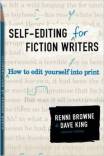 Covering the basics in an easy to digest fashion, Self-Editing for Fiction Writers is my favourite book about writing. I’ve gone back to it many times as it covers the basics so well. Starting with the obligatory show don’t tell chapter, it moves on at a pace to cover point of view, dialogue, interior monologue, beats, and a range of other areas. The content is well organised and there are plenty of practical tips.
Covering the basics in an easy to digest fashion, Self-Editing for Fiction Writers is my favourite book about writing. I’ve gone back to it many times as it covers the basics so well. Starting with the obligatory show don’t tell chapter, it moves on at a pace to cover point of view, dialogue, interior monologue, beats, and a range of other areas. The content is well organised and there are plenty of practical tips.
2. Solutions for Writers, Sol Stein
Buy Now for £12.99 new / £4.09 used
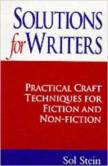 Stein has edited some of the biggest names in the business and really knows his onions. Solutions for Writers, (along with Solutions for Novelists), covers the expected range of topics with authority. Dialogue, plotting and first-lines, are discussed most effectively. Again, it’s a resource you’ll find yourself coming back to again and again.
Stein has edited some of the biggest names in the business and really knows his onions. Solutions for Writers, (along with Solutions for Novelists), covers the expected range of topics with authority. Dialogue, plotting and first-lines, are discussed most effectively. Again, it’s a resource you’ll find yourself coming back to again and again.
3. Save the Cat, Blake Snyder
S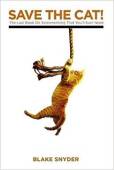 ome of the most useful books about plotting fiction are about writing screenplays and Snyder’s snappy guide to plotting Hollywood money-spinners is a great way to get to grips with, or reaffirm the basics of, driving your story forward. The same criticisms levelled at this book apply whether you’re writing a novel or a screenplay – it’s about writing stories that sell, not necessarily about being a great writer – but if you’re having issues with your plotting, this book can help you work out what to do next, or at least what not to do next.
ome of the most useful books about plotting fiction are about writing screenplays and Snyder’s snappy guide to plotting Hollywood money-spinners is a great way to get to grips with, or reaffirm the basics of, driving your story forward. The same criticisms levelled at this book apply whether you’re writing a novel or a screenplay – it’s about writing stories that sell, not necessarily about being a great writer – but if you’re having issues with your plotting, this book can help you work out what to do next, or at least what not to do next.
4. On Writing, Stephen King
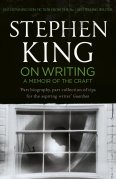 There aren’t many contemporary ‘best books for writers’ lists that don’t have On Writing in them, and that’s because it’s one of the most interesting and unique books on the craft out there. Roger Ebert said of On Writing, that it ‘had more useful and observant things to say about the craft than any book since Strunk and White’s The Elements of Style‘.Part childhood memoir, part writer’s tool-kit, On Writing is eminently readable and contains plenty of no-nonsense, tough-love advice in a tone of voice King’s readers will appreciate.
There aren’t many contemporary ‘best books for writers’ lists that don’t have On Writing in them, and that’s because it’s one of the most interesting and unique books on the craft out there. Roger Ebert said of On Writing, that it ‘had more useful and observant things to say about the craft than any book since Strunk and White’s The Elements of Style‘.Part childhood memoir, part writer’s tool-kit, On Writing is eminently readable and contains plenty of no-nonsense, tough-love advice in a tone of voice King’s readers will appreciate.
How Fiction Works, James Wood
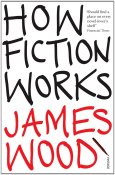 This slim volume is something of a must read, an enthusiastic examination of the writer’s art, beginning with Flaubert and narrative and moving on to cover character, language dialogue and realism. It’s much less a how-to than the other books on this list and is more about deconstructing why a good piece of writing is good, what makes it work and why. The blurb calls it playful and profound, and I’d tend to agree.
This slim volume is something of a must read, an enthusiastic examination of the writer’s art, beginning with Flaubert and narrative and moving on to cover character, language dialogue and realism. It’s much less a how-to than the other books on this list and is more about deconstructing why a good piece of writing is good, what makes it work and why. The blurb calls it playful and profound, and I’d tend to agree.
Honourable mentions for: Story: Style, Structure, Substance, and the Principles of Screenwriting, by Robert McKee; The Elements of Style, by Strunk and White, Elements of Fiction Writing – Beginnings, Middles & Ends, by Nancy Kress and Hooked: Write Fiction That Grabs Readers at Page One & Never Lets Them Go, by Les Edgerton.
These are the books that have stood out for me – that are different enough or effective enough to be worth a place on my book shelf. Which books about writing have stood out for you?
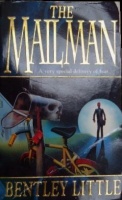 Currently reading:
Currently reading: